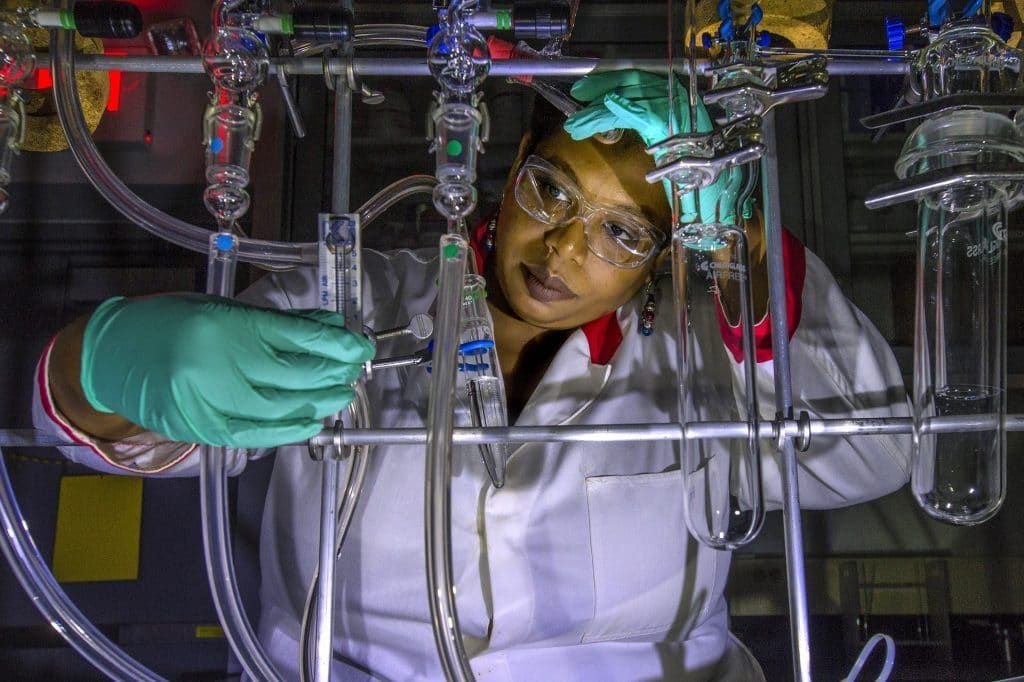How to make sure neutrons save lives instead of end them
By Julia Phillips, Miles A. Pomper, William Tobey | May 12, 2021
 Applying radiochemistry to nuclear energy and medicine. Jasmine Hatcher's work in Brookhaven's Medical Isotope Research and Production Program focuses on extracting Actinium-225, a rare radioactive element that can be used in cancer radiation therapy. Photo accessed via Flickr. CC BY-NC-ND 2.0.
Applying radiochemistry to nuclear energy and medicine. Jasmine Hatcher's work in Brookhaven's Medical Isotope Research and Production Program focuses on extracting Actinium-225, a rare radioactive element that can be used in cancer radiation therapy. Photo accessed via Flickr. CC BY-NC-ND 2.0.
Neutrons are keys that unlock atomic explosions and the controlled generation of electricity in nuclear power reactors, and they advance a wide variety of human purposes. Among other uses, they help to: test and qualify new power reactor designs and fuels; manufacture medical isotopes to treat and diagnose deadly diseases such as cancer and cardiovascular ailments; and advance basic research in chemistry, physics, and the life sciences.
A wide variety of institutions own and operate the research reactors that produce neutrons to meet these needs, including governments, universities, private companies, and national laboratories. Perhaps because of this diverse ownership base, there is no central mechanism within the United States or globally that assesses neutron needs for medical, scientific, and industrial purposes and how to meet them. Yet, such reactors are not cheap. Jordan’s Research and Training Reactor, which first went critical in 2016, reportedly cost $161 million. Moreover, because of long construction lead times, extensive and lengthy regulatory reviews, and the finite operational lifetimes of existing reactors, accurate planning is essential. Gaps in neutron production could cost lives; excessive redundancy would be very expensive.
For these reasons, a 2016 National Academies of Sciences, Engineering, and Medicine study committee (chaired by Phillips and including Tobey) recommended that the United States develop a 50-year strategy “that enumerates and evaluates the importance of anticipated US civilian needs for neutrons and provides a roadmap for how these can best be provided by reactors and other sources that do not use highly enriched uranium.”
That recommendation, however, didn’t go far enough. After all, the market for neutrons and their products and benefits is global. Fifty-three countries operate some 224 research reactors, with nine new plants under construction. Ten such facilities supply more than 95 percent of one of the world’s leading medical isotopes, and many of those, including all of the high-performance reactors in the United States, have operated for nearly half a century, if not more. Thus, international planning and coordination of neutron needs and how to supply them are vital.
The issue is complicated by today’s use of highly enriched uranium in the production of some medical isotopes, either as research reactor fuel or in the targets that are transformed into the beneficial isotopes. Using highly enriched uranium incurs risk that the material will be diverted or stolen for use in nuclear weapons. To prevent this, more than 100 research reactors fueled by highly enriched uranium have been converted to use low enriched uranium or been shut down. More work, however, remains to be done, as some 72 highly enriched uranium-fueled research reactors powered continue to operate.
To ensure that the world has reliable access to the neutrons it needs, at the lowest possible cost, and to facilitate further efforts to minimize and eventually eliminate civilian use of highly enriched uranium, we need an international mechanism to anticipate worldwide neutron needs and plan how to meet them. In essence, the 2016 National Academies’ report recommendation (which sadly remains unfulfilled even in the United States) should be internationalized.
The institution best placed to facilitate such planning is the International Atomic Energy Agency (IAEA). The effort should be voluntary and nonbinding. (Few, if any, nation-states would be willing to cede decision-making about the supply of something as vital as lifesaving medical isotopes to an international organization on a mandatory basis.) The effort could start with a meeting to establish a registry of anticipated production capacity and needs, including schedules for reactor outages, retirements, and new construction. Such an effort has precedent. The Organization for Economic Cooperation and Development has coordinated the somewhat narrower issue of a secure supply of medical isotopes.
An IAEA-based registry of capacity and needs would help to identify potential gaps and redundancy well into the future. It could also facilitate conversion or closure of remaining plants that use highly enriched uranium for fuel, reducing proliferation and nuclear terrorism risks. Further, it would advance the Non-Proliferation Treaty’s Article IV guarantee of the “inalienable right of all the Parties to the Treaty to develop research, production and use of nuclear energy for peaceful purposes…” Even countries without research reactors could assure themselves of access to such benefits.
To maximize the benefits and minimize the risks associated with using neutrons, we need better international coordination, including an international inventory of current and future needs and the cabilities to meet them. A regular experts’ meeting at the IAEA is just the place to do it. Such a system would benefit producers and consumers in both developed and developing countries and help realize the promise of peaceful uses of nuclear energy guaranteed by the Non-Proliferation Treaty.
Together, we make the world safer.
The Bulletin elevates expert voices above the noise. But as an independent nonprofit organization, our operations depend on the support of readers like you. Help us continue to deliver quality journalism that holds leaders accountable. Your support of our work at any level is important. In return, we promise our coverage will be understandable, influential, vigilant, solution-oriented, and fair-minded. Together we can make a difference.
Keywords: IAEA, International Atomic Energy Agency, medical isotope, neutron
Topics: Nuclear Risk, Nuclear Weapons

















